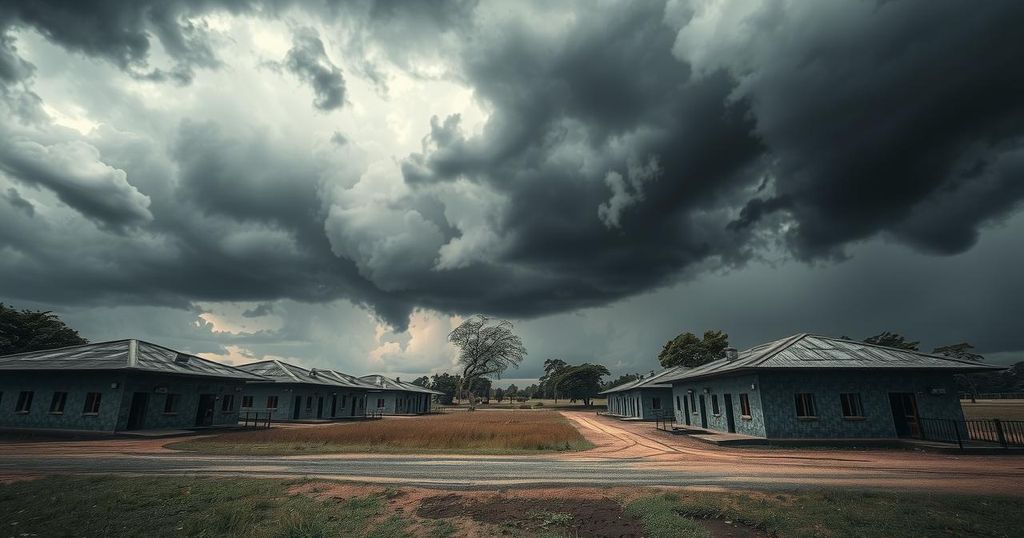Crisis in South Sudan: Urgent Appeal for Peace Amid Rising Tensions

The security situation in South Sudan is deteriorating, with escalating tensions between the SPLM and SPLM-IO raising fears of renewed civil war. The UN and international partners are seeking to protect the 2018 Revitalized Peace Agreement while addressing a significant humanitarian crisis impacting millions. Political actions, including the detainment of SPLM-IO officials and clashes in Juba, highlight the urgent need for peace efforts.
The security situation in South Sudan has drastically worsened due to heightened tensions between its two main political factions: the Sudan People’s Liberation Movement (SPLM) led by President Salva Kiir Mayardit, and the Sudan People’s Liberation Movement in Opposition (SPLM-IO) headed by First Vice President Riek Machar. This escalation has placed the fragile nation on the brink of a potential civil war relapse.
On March 4th, the youth militia known as the White Army overtook military barracks previously held by the South Sudan People’s Defense Forces (SSPDF). In retaliation, aerial bombardments targeted civilian areas in the Upper Nile region, allegedly utilizing highly flammable devices. These airstrikes have resulted in numerous casualties and injuries, prompting the displacement of approximately 100,000 individuals.
Concerns regarding escalating violence are further heightened by reports indicating the mobilization of both the White Army and SSPDF, including the dubious recruitment of minors. On March 24th, clashes between the SSPDF and SPLM-IO forces occurred in the capital, Juba, intensifying fears that the conflict may spread similarly to the civil wars of 2013 and 2016. The United Nations has cautioned that the current events jeopardize the 2018 Revitalized Peace Agreement.
Politically, multiple officials from the SPLM-IO have faced removal, detention, or have gone into hiding, with Riek Machar reportedly placed under house arrest as of March 26. Nicholas Haysom, head of the UN peacekeeping mission in South Sudan (UNMISS), remarked, “South Sudan is teetering on the edge of a relapse into civil war… There is only one way out of the cycle of conflict, and that is to return to the Revitalized Peace Agreement.”
The UN, in collaboration with international and regional agencies, is actively attempting to avert further conflict. Partnerships with the African Union (AU), East Africa’s Intergovernmental Authority on Development (IGAD), and the Reconstituted Joint Monitoring and Evaluation Commission (RJMEC) are critical in safeguarding the gains achieved since the signing of the peace agreement. However, these diplomatic efforts depend greatly on the parties’ willingness to pursue peace.
UN Secretary-General emphasized, “Now more than ever, the leaders of South Sudan must hear a clear, unified and resounding message: Put down the weapons. Put all the people of South Sudan first.”
South Sudan attained independence from Sudan in 2011 after a prolonged conflict, but enduring peace has been elusive. Political rifts led to civil unrest just two years post-independence, resulting in widespread violence and a humanitarian crisis. The 2018 Revitalized Peace Agreement offered hope; however, its implementation has stagnated, leading to numerous extensions of the transitional phase and delays in democratic elections. Current tensions threaten this peace process, exacerbating a humanitarian crisis that requires assistance for over nine million people, approximately 75% of the population. Additionally, the economic situation is dire, impacted by a swollen influx of returnees, cholera outbreaks, decreasing oil revenue, and soaring inflation.
Established in 2011, the United Nations Mission in South Sudan (UNMISS) aims to foster peace, security, and development in the nation. The mission continues to focus on strategies that prevent civil war relapse, promote self-reliance, and build a sustainable environment for inclusive governance and democratic elections.
In summary, South Sudan is confronting a critical juncture, facing the prospect of renewed civil war due to escalating political tensions and violence. The international community, particularly through the UN and regional organizations, is actively pursuing diplomatic avenues to restore peace. However, the responsibility lies with South Sudanese leaders to prioritize dialogue and reconciliation, ensuring the protection of their populace and the adherence to the peace agreement. Failure to act now risks deepening the humanitarian crisis and destabilizing the region further.
Original Source: peacekeeping.un.org








